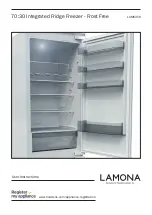
Consumer Support
Tr
oubleshooting T
ips
Operating Instructions
Safety Instructions
Installation Instructions
11
Normal operating characteristics.
ge.com
These things are normal and
do not indicate a need for service.
■
A warm cabinet exterior as the refrigeration system transfers heat from the inside to the outside through
the exterior cabinet walls.
■
The sound of the high-efficiency compressor motor.
Before you call for service…
Troubleshooting Tips
Save time and money! Review the charts on the following
pages first and you may not need to call for service.
Problem
Possible Causes
What To Do
Freezer does not
Temperature control
•
Move the control to a temperature setting.
operate or Power-On
in
OFF
position.
Light is not on
Freezer is unplugged.
•
Push the plug completely into the outlet.
The fuse is blown/circuit
•
Replace fuse or reset the breaker.
breaker is tripped.
Freezer starts/stops
Door/lid left open.
•
Check to see if package is holding door/lid open.
too frequently
Too frequent or too long
door/lid openings.
Temperature control
•
See
About the operation of your freezer.
set too cold.
Freezer operates
Door/lid left open.
•
Check to see if package is holding door/lid open.
too long
Too frequent or too long
door/lid openings.
Temperature control
•
See
About the operation of your freezer.
set too cold.
Inadequate air circulation
•
See
Preparing to install the freezer.
space around cabinet.
Fast Freeze switch is in the
•
See
About the operation of your freezer.
ON
position (on some models)
Noisy operation
Floor may be weak, causing
•
Placing 2 X 4’s (51 mm X 102 mm) under the length of
or cabinet vibrates
freezer to vibrate when
the freezer will help support it and may reduce vibration.
compressor is on.
Cabinet is not positioned
•
See
Preparing to install the freezer.
Or use shims for
solidly on floor.
uneven floor.
Freezer temperature
Door/lid left open.
•
Check to see if package is holding door/lid open.
too warm
Too frequent or too long
door/lid openings.


































